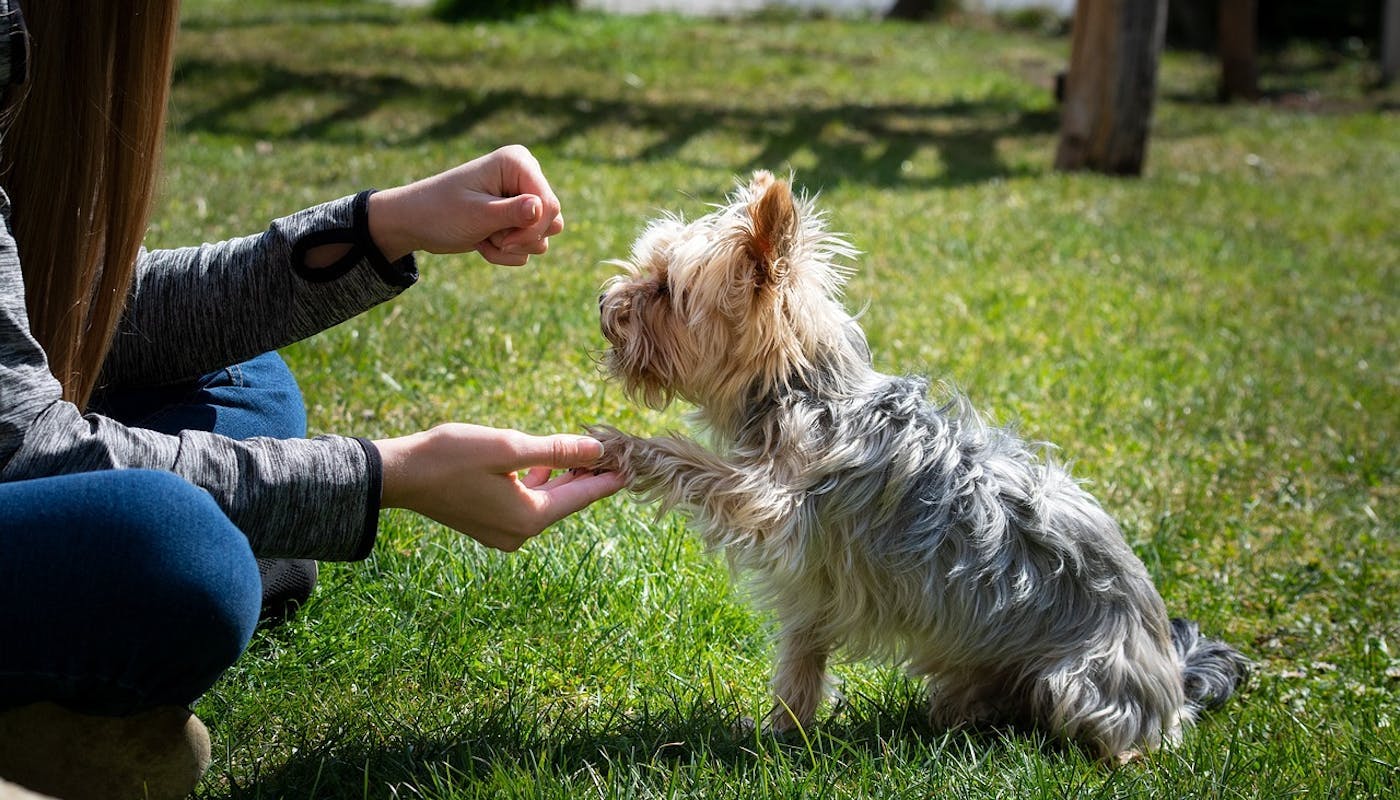What is Reward-based Training?
Reward-based training involves rewarding desired behaviors with treats or praise. It’s a positive reinforcement method which develops a strong bond between owners and their dogs. If you want a happy home environment and a dog who’s keen to please, we think that reward-based training is the best way to go!
How Does It Work?
Reward-based training is a method in which you reward your dog for doing something right. That doesn’t have to be an action; it could also be a lack of action (like ignoring the cat while she walks through the room).
Are you wondering why reward-based training sounds like bribery? There’s a subtle difference. Bribery entails giving treats before the desired behavior takes place. In reward-based training, you’ll only give a treat afterwards, until the good behavior becomes a habit.
You can start reward-based training as soon as your puppy’s able to pay attention, the ideal ‘window’ being around 12 weeks to 2 years of age. “Watch me” is a good command to start with, because it gets your dog’s attention focused on you.
To teach this command, you’ll start by simply rewarding the dog whenever they take the desired action (in this case, that’s making eye-contact with you). Then introduce the word and reward them when they respond.
What Rewards Should You Use?
You can use any reward which appeals to your dog. Some trainers recommend using a clicker – that’s useful to indicate the moment that the dog did what you wanted. This should be accompanied by a reward like praise or treats.
If using treats, choose high-value foods/learn/dog-training/everything-you-need-to-know-about-dog-training-treats – special snacks that your dog loves.
It’s wise to include a unique word of praise so that you can continue to use that when you phase out treats (or forget to bring them out with you!).
Especially while your dog is young, play is a great reward. You can train them to bring back a ball simply by throwing it again with excitement.
Some breeds take more naturally to retrieving toys (and giving them back) than others. If you notice your dog is reluctant to give the toy back or they’re more interested in getting you to chase them, try offering an exchange. You offer them another toy and they drop the first one, they get praise for dropping the first you and the second toy is their reward. This can be a good way to nip any unwanted running off with other household items in the bud too - chasing after pup when they’ve got your shoes is a fun game to them but there’s only so many times your boss is going to accept that excuse for you being late for work!
Eventually, your dog will be trained in good habits, and you won’t need to give them a treat every time.
What are the Benefits of Reward-based Training?
Researchers and professional trainers have shown that reward-based training is more effective than a system which uses punishments and scolding. Dogs who aren’t intimidated by their owners are less likely to feel stress, and they’re less likely to develop behavioral problems. Instead, you’ll have a positive atmosphere and a dog who is generally keen to please.
Reward-based training is fun for your dog. They’ll probably feel excited when you signal the start of a training session! They’ll see you as the authority and provider of treats; it’s no wonder that dogs who are trained this way develop a stronger bond with their owner.
Why Scolding and Asserting Dominance DON’T Work…
Asserting leadership and dominance was once a popular training method. Trainers would recommend that we feed ourselves before our dogs, we don’t allow dogs through the doors first, and so on.
But that idea has now been debunked.
Research has shown that wolves (our dogs’ ancient ancestors) don’t live in a pack hierarchy, and they don’t fight for position. In fact, they live in family groups, with mom and dad leading from the rear. When food is scarce, the parents will usually eat last.
So it’s highly unlikely that our dogs would attempt to assert dominance, since their nature tells them to respect and follow their elders.
If they are displaying unwanted behavior, it’s more likely to be caused by one of three things:
- Fear
- Stress
- Unintentional reinforcement of the behavior (“behaving this way gets me attention!”).
Scolding our dogs increases their fear, stimulating production of the stress hormone (cortisol) and reducing their decision-making capacity.
Are You Unintentionally Rewarding Your Dog’s Behavior?
If your dog is doing something that you don’t like, they’re probably getting a ‘reward’ from it. And if you want to prevent that behavior, you need to remove that reward!
First, you’ll need to identify what it is.
Stealing food has its own, obvious, reward (and the solution is always to keep that food out of your dog’s reach). But why is your dog carrying the remote control underneath the table? Well, in that case, they’re probably winning your attention – especially if you were busy and ignoring them. Sometimes boredom drives our dogs to discover new ways to entice owners to play. Try providing them with challenges such as puzzles, feeding mats, or Kong treat toys.
Further Reading
If you haven’t brought home a dog yet, discover our list of the most trainable dog breeds!/learn/dog-training/the-easiest-dog-breeds-to-train Here are some basic commands/learn/dog-training/basic-commands-to-teach-your-dog to kick-start your dog’s training. It’s important to have strong recall/learn/dog-training/how-to-teach-a-dog-to-come when you’re ready to take your dog off-leash. Here’s why the “alpha roll” should never be attempted/learn/dog-training/top-dog-training-techniques, and how to tell if your dog is feeling stressed/learn/dog-lifestyle/7-signs-that-your-chilled-dog-might-actually-be-stressed.
